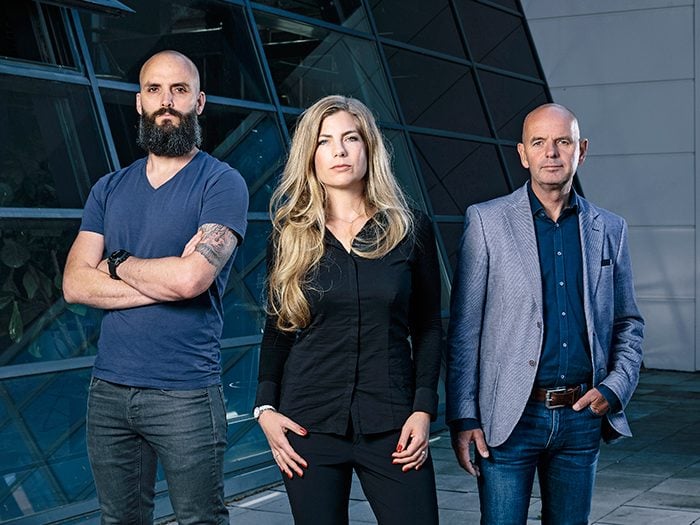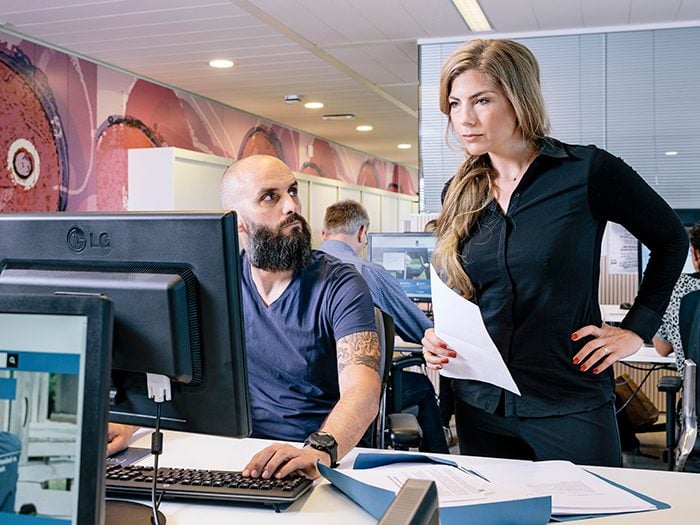
Covert surveillance
The package weighed just five kilos and had been sent from China. The import declaration stuck to the outside stated that it contained potassium carbonate, a chemical used in baking. When Dutch customs officers in Nijmegen, close to the German border, opened it they suspected the white powder was cocaine. But lab tests revealed something quite different, yet equally sinister: the substance was 17-beta oestradiol, a growth hormone used to bulk up cattle that has been banned in the European Union for almost 30 years.
This small quantity of powder, worth 75,000 euros, was enough to dose 250,000 veal calves and endanger Europe’s food chain. Scientists describe it as “a complete carcinogen.” Never before had so much of this banned substance been found in the Netherlands.
It was time to call in specialist food fraud detectives from the investigation division of the Netherlands’ food and consumer product safety authority. Known as the NVWA-IOD, the division’s HQ is on a tree-lined boulevard in Utrecht.
In their high-security offices, the NVWA-IOD’s investigators have a heavy workload. In one of the computer rooms, banks of screens buzz as detectives analyze intelligence reports, covert video, and wiretap transcripts.
One of these inspectors is 39-year-old Karen Gussow. “We have exactly the same powers of arrest, surveillance and intelligence gathering as the police,” she says. “The only difference is that we don’t carry guns.”
Nonetheless, as Gussow points out, food fraud is a deadly business: “All the research shows that even small residues of growth hormone in beef can trigger cancers.” Children are particularly at risk.
“We went to the Public Prosecutor to ask if we could replace the contents of the suspect package with actual baking powder,” Gussow explains. “He also gave us permission to add tracking and bugging devices and we returned it to the parcel delivery system.”
The package was duly delivered to a logistics centre at Roden, a village near Groningen, where the food detectives had set up a covert surveillance camera. In the gathering gloom of a late November afternoon, a 69-year-old man arrived to collect the package, unaware that seven investigators in unmarked cars were watching. He then drove 85 kilometres south to Emmeloord and checked into a four-star hotel.
Investigators listened in from a nearby police station as the suspect made a series of calls on several mobile phones. He was about to pass the package on. As he had dinner that evening, two detectives were sitting at an adjoining table.
When the handover failed to take place, the food detectives stormed his room and arrested him. The suspect, who cannot be named for legal reasons, told them that he had a bona fide company making veterinary drugs. But it proved to be just a front. In 2016 he was sentenced to 18 months.
“Not only did he get his package, he got us too!” says Karen Gussow with a wry smile.

A borderless crime
Food fraud is booming throughout Europe and globally. In terms of money generated, it is as profitable as drug running and human trafficking. It takes several forms that, unlike banned growth hormone, directly affect consumers.
“Criminals adulterate products, such as cheap wine with pure alcohol, or beef with horsemeat, paying no heed to the safety of consumers, and then pass them off as quality products to secure maximum profit,” says detective Chris Vansteenkiste.
This square-jawed, 54-year-old Belgian leads the Intellectual Property Crime Unit of Europol (the EU Agency for Law Enforcement Cooperation), which coordinates individual national anti-food fraud operations.
“Sometimes criminals falsify country-of-origin documentation, or inaccurately claim that products are organic,” he says. “They apply fake barcodes and sell-by dates on sub-standard food that is unfit for human consumption. By and large, consumers trust what they eat and, whether it’s fish, eggs, herbs or ice cream, the fake packaging is convincing enough to part them from their cash.”
But the fightback is on. Since 2011, Europol and its international counterpart Interpol have led an annual global operation to combat food crime. Called Operation OPSON, it began in a small way with 10 countries participating.
By 2017, OPSON had grown to include 65 nations, among them 22 EU member states. In one four-month period, thousands of raids seized 13,400 tonnes and 26.3 million litres of counterfeit or substandard food and beverages. The total value was 236 billion euros. The raids led to more than 6,200 administrative and criminal cases.
“Everything that can be produced can be counterfeited,” says Chris Vansteenkiste, who coordinated the OPSON operation last year from Europol’s imposing headquarters in four brutalist office blocks in The Hague. “Every sector is touched.”
In Portugal, a surveillance operation by the country’s food safety authority revealed that a food-processing factory in Porto, which had been stripped of its licence, was still operating.
“When investigators went in, they found unhygienic vats of sardines and other fish that were unfit for human consumption. There were 300,000 cans and 24,000 labels with fake barcodes and consumption dates showing the fish was destined for export throughout Europe,” says Vansteenkiste. “The conditions were disgusting. The smell was unimaginable—no concern for human safety at all.”
In Italy, the Florence-based anti-mafia unit moved in on a remote farm in the Tuscan countryside. Inside the farm buildings, Carabinieri found cases of vintage wines from Italy’s premier vineyards. The bottles looked genuine, as did the corks and the labels, but lab tests revealed they contained low-quality wine to which pure alcohol had been added to swell volume and profits.
“This was a highly professional operation conducted by an organized crime group,” says Vansteenkiste. “We also seized printing and other equipment which they used to fake barcodes and watermarks.” Three people were arrested and further prosecutions are pending.
Operation OPSON reveals the ubiquitous nature of food fraud: 179,000 fake seasoning cubes were seized by French Customs; unlabeled meat smuggled in an unrefrigerated van was intercepted in Ireland; 1.3 tonnes of roasted hazelnuts were found to contain allergenic peanuts in Germany; virgin olive oil in Denmark was revealed to be unrefined lampante oil, which is unfit for human consumption.
In a 12-month period three major organized crime groups in Europe have been taken out of action and seven more globally.
The fight against food fraud goes on around the clock. Most countries in Europe have established food crime units similar to the Netherlands’ NVWA-IOD, which has been hunting down criminals for 20 years. Europol supports this by running workshops for companies, investigators, and policy makers to strengthen networks across Europe and share intelligence, while its Criminal Assets Bureau confiscates criminal cash and assets.
“International gangs are moving away from running drugs and firearms into illicit trade because the rewards are great, and if they do get caught they have less chance of going to prison for 20 years,” says Michael Ellis, a food crime consultant who until 2016 managed Interpol’s illicit trade and anti-counterfeit crime directorate.
“That’s why we need international coordination to stop them. More and more governments and enforcement agencies have realized that this is not a victimless crime. It is harming societies, harming economies and, frankly, killing people.”
According to the World Health Organization (WHO), the Czech Republic, Poland, Norway, and Estonia are among a group of countries plagued by deaths and organ damage from alcohol containing methanol. WHO reports that “the size of these outbreaks ranges from 20 to over 800 victims with fatality rates of over 30 per cent.”
A cheap alcohol used in industrial applications and antifreeze, methanol is highly toxic when ingested. Dozens died in a spate of poisonings in the Czech Republic in 2012 that were attributed to vodka and rum tainted with methanol and sold at markets and kiosks.

The appliance of science
The challenges facing investigators are compounded by the complexity of today’s food supply chain.
“We don’t know anymore where what we eat comes from,” says Professor Chris Elliott, who in 2013 founded the Institute for Global Food Security at Queen’s University Belfast in Northern Ireland.
Its cutting-edge laboratory can analyze the molecular fingerprint of food against a library of thousands of species profiles collected by Elliott’s team from all over the world. It holds 2,000 samples of rice alone.
Behind steel, bomb-proofed doors that protect the outside world from the toxins they work on, Elliott’s team of 40 focuses on developing anti-food fraud technologies for use by government agencies and investigators.
“Many ready meals contain up to 50 ingredients, and food supply chains are so complex that each transaction, from farm or ocean to market stall or supermarket shelf, is an opportunity for a criminal,” says Elliott. “Tracking and tracing them all is where we come in.”
Take fish, one of Elliott’s favourite topics. Norwegian and Russian factory ships remove the heads and guts from the fish they catch, which are then frozen, sent to China, thawed, filleted by cheap labour, re-frozen into large blocks and shipped to South Korea. “There, they have cold stores the size of football stadiums and the traders come to buy,” Elliott says. “They in turn sell on to other traders, who sell them to retailers.
“In a journey of thousands of miles there is ample opportunity for criminals to bulk up fillets with salty water, substitute species, or label bulk catch as line caught.” Supermarket chains put a lot of effort into securing their supply chains and do their own testing,” Elliott says, “but nothing can be 100 per cent effective.”
Elliott admits, “I have been threatened because of the work we do. Where organized crime is in play, such as the Mafia’s involvement in adulterated olive oil, there is always a risk, because wherever you look for fraud you will find it.”
But are sentences tough enough? Off the record, there is a resounding “no” from investigators. Take the case of Dutch meat trader Willy Selten, who was arrested in 2013 by Karen Gussow and her colleagues—using evidence from informers. Behind factory gates, Selten was deboning meat from all over Europe, including 300 tonnes of horsemeat that ended up in supermarket burgers and meatloaf.
The “horsegate” fraud affected Belgium, France, Germany, Ireland, the Netherlands, Sweden, Switzerland and the United Kingdom. Prosecutors demanded five years. Selten was sentenced to half that. Five years later, he is still free pending an appeal.
“The Selten sentence is an increase on what has gone before,” says Karen Gussow. “Law enforcement officers say sentences are too light, but academic literature has consistently shown that higher sanctions do not actually deter fraudsters to the extent that people expect.” She adds: “Detection is a more important deterrent, and the fact that on average we recover more than a million euros from each of the major criminals we catch.”
And so the battle continues. “Food fraud is not a victimless crime,” concludes Gussow. “It is an attack on a basic human right to know that what we put into our bodies is safe.”
Don’t miss the 15 quirkiest news stories from 2018.